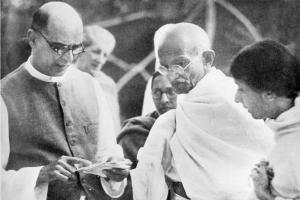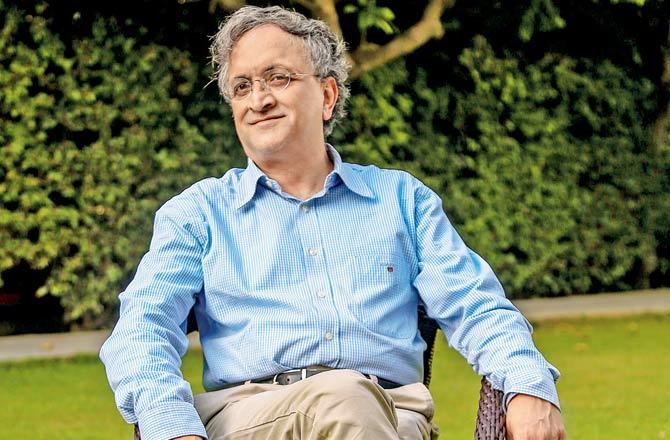Historian Ramachandra Guha on investing over three decades on researching and writing about the extraordinary life of Gandhi

Gandhi's remarkable secretary, Mahadev Desai, at his side as always, as so often explaining a word or phrase to him. Pic courtesy/SAAA
In Bollywood, it was Sanjay Dutt, who first portrayed an eccentric obsession for the Mahatma in the eponymously titled film Lage Raho Munna Bhai. Having spent a night poring over dust-laden literature related to Mohandas K Gandhi inside a library, Munna Bhai starts having hallucinatory visions of the leader.
ADVERTISEMENT
It's this vision that later guides the goon to the path of truth, integrity, and what film-maker Rajkumar Hirani wittingly made us remember as Gandhigiri. Historian and scholar Ramachandra Guha, who has just released an 1,100-page biography, Gandhi: The Years That Changed India 1914-1948 (Penguin/Allen Lane), and has spent over three decades researching him, may have never succumbed to this glorified reverence to Gandhi, but he still admits to being a "great admirer of the man."

Saraladevi Chaudhurani (seated), with whom Gandhi once contemplated a 'spiritual marriage', photographed with her sister. Pic courtesy/Santiniketan Archives
This also explains the 60-year-old writer's never-ending quest to understand Gandhi, which "accidentally" began in his teens. "I grew up in the India of the 1950s, when every year on October 2, you commemorated Gandhi and sang Raghupati Raghav Raja Ram. So, there was always this halo around him," Guha recalls, in a telephonic interview from Delhi. But, his first tryst with Gandhi was when he read his autobiography (The Story of My Experiments with Truth) as a college student. "I was struck by his description of taking off his sacred thread. After that, I resolved to never wear one. For me, a sacred thread was a mark of caste distinction, and I felt if Gandhi abandoned it, so should I."
The motivation to explore the Gandhian narrative, however, got hold of him, when he was pursuing his PhD on the history of environmental movement in India in the 1980s. On realising that its "main actors [Chandi Prasad Bhatt, Medha Patkar] were influenced by Gandhi's methods of analysis, critique, struggle and reconstruction," Guha's curiosity piqued. From thereon, he started extensively consuming stories about Gandhi. The first book that had a significant impact on him was Belgian writer JTF Jordens's Gandhi's Religion.

Ramachandra Guha first got acquainted with Mahatma Gandhi's life as a college student, when he read the latter's autobiography. Pic/Nishad Alam
"It was a very moving and sympathetic account of Gandhi's religious pluralism, and provided an insightful understanding of everything he stood for," Guha says. Later, while writing about the social history of cricket, he once again realised how Gandhi had influenced the manner in which the game was watched, played and talked about. "I was being stalked by Gandhi's shadow," he admits.
It wasn't long before he started gathering material and books around and about the remarkable historical figure. "And I did it without really thinking that I would one day write a biography on him. That idea struck me only 15 years ago, when I realised that Gandhi in either an influential or marginal way was seeping into whatever I was working on." His new magnum opus, a "free-standing" sequel to his first biography Gandhi Before India, which traced Gandhi's childhood and his decades as a lawyer-activist in South Africa, shifts the focus to India, where he returned in 1914. The book takes us right into the scene of action, as Gandhi spearheads a host of revolutionary and reformatory movements, before he is dramatically assassinated in 1948. Together, the tomes provide a holistic perspective on the leader's life.
What makes this new account fascinating is that Guha happens to be the first biographer to have access to the recently-opened Gandhi papers at the Nehru Memorial Museum and Library in New Delhi. "The material was collected by Gandhi's first and most remarkable secretary Mahadev Desai, and later, Pyarelal Nayar. These papers track and document Gandhi's correspondence from all over the world, his campaigns, letters to the Congress, and the criticism to his work, offering us a sense of a range of Gandhi's influence,"
he says.
Apart from the back-stories behind the many revolutionary movements that set the stage for Gandhi's demand for self-rule, Guha also touches upon the romance between Gandhi and Saraladevi Chaudhurani, the niece of Rabrindranath Tagore, whom he first met in Lahore. Their affair, though short and not consummated, was "very intense," as visible in the letters that Gandhi sent to her, and which were painstakingly documented by Desai. That history has never judiciously discussed this story doesn't come as a surprise to Guha.
"I think there is a certain prudishness among the older generation of historians, who tend to exalt the public image at the expense of the personal," he says. "I wanted to discuss Gandhi and Saraladevi in a way that was not scandalous, but human. They were enchanted by one another, but Gandhi could not have made a public display of his affection for her, because they were still part of a conservative society."
But Gandhi's personal life — marred by him being a difficult father and husband and the bizarre obsession with celibacy, which also saw him conduct the strangest experiment of sharing the bed with his grand-niece Manu — never once took away from his far-reaching political and social work, of which Guha feels the anti-untouchability campaign was most challenging. "It's easy to mobilise people in a campaign for political freedom, but to ask Hindus to introspect on how they were treating a section of the society was commendable," he says.
Having lived with Gandhi through his working career, Guha, who says he should be retiring now, is relieved that he has finally put the Gandhian story to bed. He, however, can't be sure if his quest to know more is over. "I admire the man, but, of course, with reservation. Gandhi's life is one lived in the open and his story is extraordinary in the way he shaped the country and the world. I don't know [if am obsessed with Gandhi]… there are some things that are mysterious in every human being that perhaps, the individual himself/herself will never be able to understand. But all I wanted to do was provide a very layered, nuanced and textured account of Gandhi, and that's why I prolonged."
Catch up on all the latest Mumbai news, crime news, current affairs, and also a complete guide on Mumbai from food to things to do and events across the city here. Also download the new mid-day Android and iOS apps to get latest updates
 Subscribe today by clicking the link and stay updated with the latest news!" Click here!
Subscribe today by clicking the link and stay updated with the latest news!" Click here!







